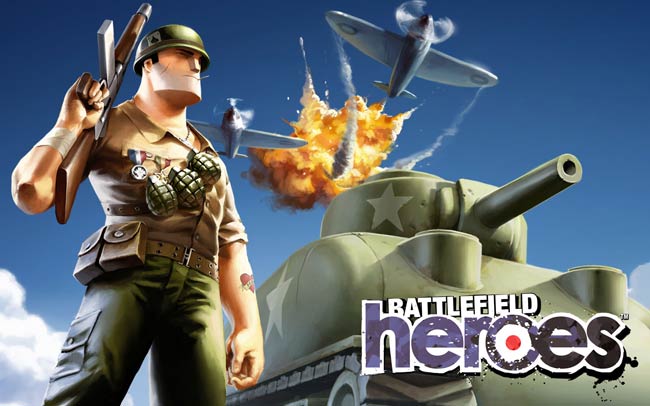Released in the summer of 2009, Battlefield Heroes immediately caught my attention. It was a online third person shooter that offered an experience that was quite different from the traditional interpretation of the shooter genre (gritty, bloody, aiming to provide a semi-realistic or realistic military focus). But the contrasting gameplay style wasn’t what caught my attention initially, it was the free to play aspect that really drew me in. This game was built on a system where you didn’t necessarily have to pay to play. If you were good enough you could earn the points needed to purchase the weapons that you wanted to use (you needed to keep a steady stream of points coming in because your purchases were timed and expired after a certain period of time). If you didn’t have the skill or didn’t want to spend the time earning your own points you could purchase points yourself and use them to outfit your character in unique ways and obtain weapons permanently.

For me, this was a beautiful mix. A game put together in a professional manner that offered a st
able, enjoyable and unique playing
experience all for free. My brother and I spent countless hours (perhaps even hours that we would prefer not to count, 😉 ) playing the game together and making short work of the forces arrayed against us. It seemed that we had finally found something that we could stick with and enjoy playing together for a good stretch of time.
One of the trailers for the game, note the over-the-top music/theme. One of the many joys of playing it was its sense of humour, :).
However, like many good things this balance was not to last. Driven by their corporate mandate to increase profit and add to their bottom line the Battlefield Heroes began implementing changes that would change the game forever. The first change that they made was to greatly reduce the amount of Valour Points (the points you earned for in game successes – quest completions, kills, etc. – that you could then use to purchase weapons temporarily) so that it became nearly impossible to use anything but the default weapons (which put you at a significant disadvantage) if you were not purchasing Battle Funds (the in-game currency that you had to pay to obtain). The reason for this was due to the timed nature of your Valour Point weapon purchases.
With the change, nobody but the most devoted players were able to amass enough Valour Points before their next weapon purchase was due. The game became heavily skewed towards those who were willing to purchase Battle Funds and outfit themselves with the best weapons and consumables. For me, a young fella not wanting to put twenty dollars down for a game that he had once played for free, this meant that I could no longer have the set of options available to me as the others. Bitter, I stopped playing and turned to other options.
This brings up the conundrum for a free to play game. How do you monetize a gameplaying experience when you don’t charge for content up front or on a monthly basis? Is it possible to finance a game through micro-transactions without having those micro-transactions take the fun out of it for all the others? It is a question that still hasn’t been answered for the video game industry. I think that there is an opportunity, especially within the video game space, to charge a premium for advertising within these sorts of games because the traditional audience (18-35 year old males) is one that is very valuable to advertisers. I know that I would certainly prefer advertising to unfair gameplay. Perhaps a developer will take notice of this opportunity and develop a game geared towards that. I know that I, for one, would be very interested.
Isn’t that what marketing is about? Taking advantage of untapped demand? Like many others, I hope that someday, someone will recognize mine.